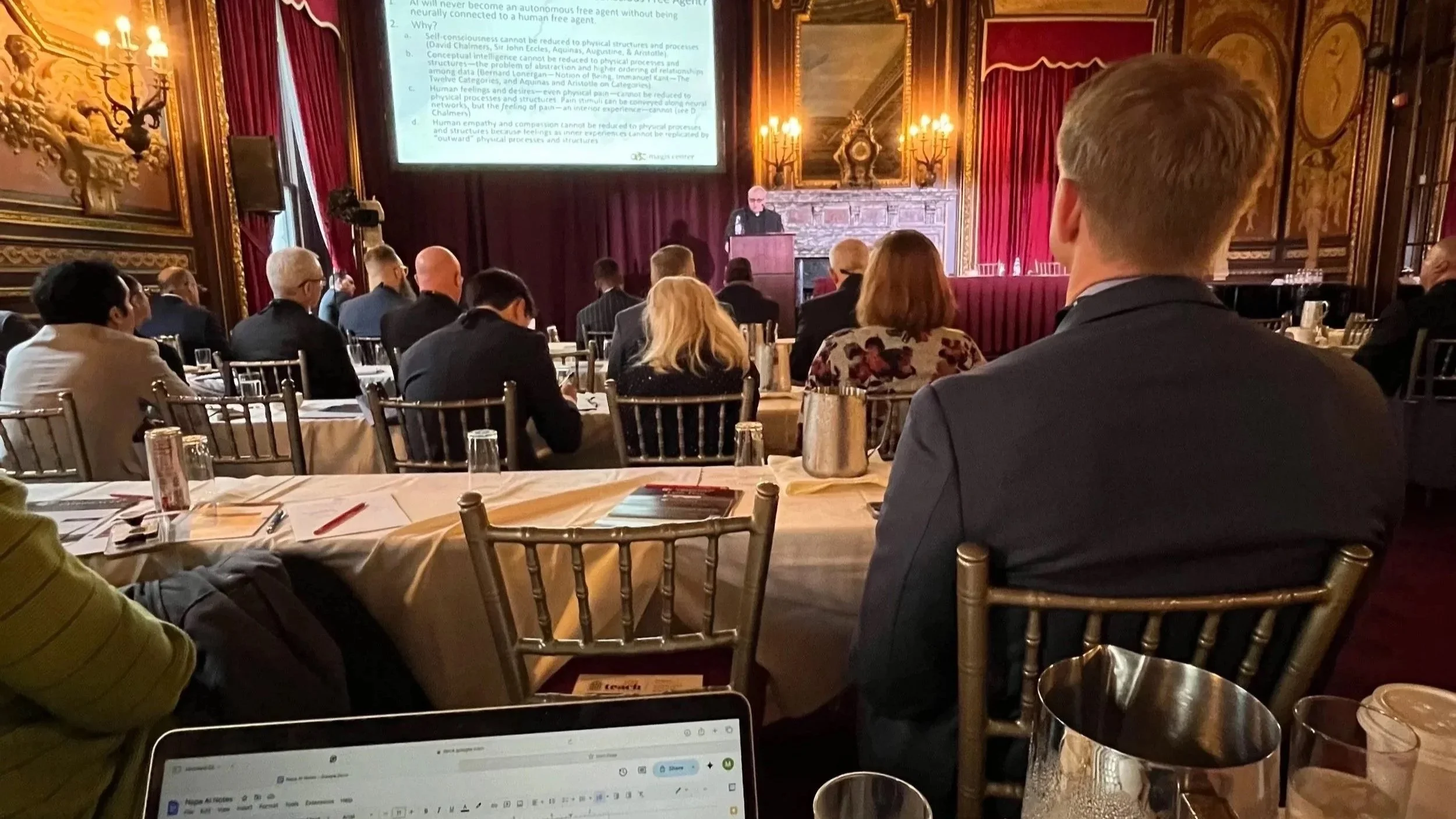Human First: Reflections on AI, Faith, and the Future of Catholic Communication
Insights from the 2025 Napa Faith & Business Conference
At this year’s Napa Faith and Business Conference, Catholic leaders, scholars, and innovators gathered to discuss one of the most urgent questions of our time: what does it mean to be human in an age of artificial intelligence?
For our team at KP Consulting Group, it was more than a conference, it was a mission check-in. As Catholic communicators, we see daily how the Church’s message of truth and hope can either flourish or falter depending on how it’s communicated. In a world increasingly shaped by algorithms, our call remains clear: to integrate technology in a way that keeps the Gospel deeply engaging and personal.
What We Heard
Fr. Robert Spitzer opened with a sobering look at AI’s challenges: the risk of “hallucinations” — false outputs confidently presented as truth — and the growing capacity of deep learning systems. When technology becomes a black box, he warned, our confidence in reality itself can erode. He spoke of privacy threats, bias, and even the danger of an “AI oligarchy” (a small group controlling vast streams of information).
But Fr. Spitzer’s deeper insight was spiritual: the danger is not just faulty data, but the dulling of our humanity.
When machines begin to mimic friendship, empathy, or creativity, people risk forgetting how to relate, to feel, and to think.
“The crafting of writing,” he said, “is the crafting of thought.” If we outsource that work, we stop wrestling with ideas—and lose the capacity to communicate love.
This struck home for our team. Communication is never just content; it’s communion. It’s the movement of the heart from one person to another, made possible only through the soul.
The human soul.
What We Learned
In sessions, we heard about orienting AI toward human flourishing. The question is not whether AI will change our work.
It already has.
But how to shape its use toward wisdom and communion, not domination and pride.
At its best, AI can free people to focus on relationships, discernment, and creativity, the very things that make us human. At its worst, it tempts us toward transhumanism, the illusion that progress means leaving our humanity behind.
For Catholic communicators, this distinction is everything. The goal is not to automate evangelization but to illuminate it.
To use tools that magnify truth, not replace encounter.
We also heard from Sarah Elk and others about the practical side of leadership in this new landscape: courage to try, fail, and adjust quickly; the importance of creativity and decision-making rooted in trust and discernment. These principles mirror what we teach our own clients—parishes, schools, and dioceses—when we help them communicate with clarity, confidence, and strategy.
Our Mission as Integrators
At KP Consulting Group, our mission has always been to accompany Catholic leaders in the sacred work of communication, where evangelization meets strategy. We integrate the tools of the world with the wisdom of the Church.
The Napa conference reaffirmed three truths that will guide our path forward:
Communication is Evangelization.
Every message, post, and conversation is a chance to share Christ. Technology is the system, the microphone, but the human heart is the message.Integration Requires Discernment.
Tools like AI can help us streamline workflows, analyze engagement, or generate ideas, but they cannot discern, they can only try to please. Discernment is a human, prayerful act that ensures our communication remains faithful and personal.Human Flourishing Is the Goal.
The Church does not exist to compete with culture, but to elevate it. Our work as communicators must lead people toward community, gratitude, and purpose. Not isolation or noise.
As one speaker reminded us: “The world doesn’t need more power. It needs more charity, more love, and more stewardship of the blessings we’ve been given.”
Where We Go from Here?
KPC will continue helping Catholic organizations navigate this new frontier by developing communication systems that are both smart and soulful. That includes:
AI-informed, human-centered strategies that keep mission before automation.
Workshops for Catholic leaders on how to integrate technology without losing authenticity. You can’t replace a personal, embodied experience.
Resources and coaching to help parishes and ministries communicate in a way that forms, not just informs.
AI may one day write faster and design better, but it will never love, never discern, never accompany.
Only people can do that.
As we return from Napa, our conviction is stronger than ever: Catholic communications must be the place where technology serves theology, and strategy serves the soul.
“Let us rise to the challenge of new discoveries and technologies by bringing to them a moral vision.” — St. John Paul II
At KP Consulting Group, we’re ready to rise to that challenge by walking alongside the Church to ensure that even in a digital world, her voice remains unmistakably human.

